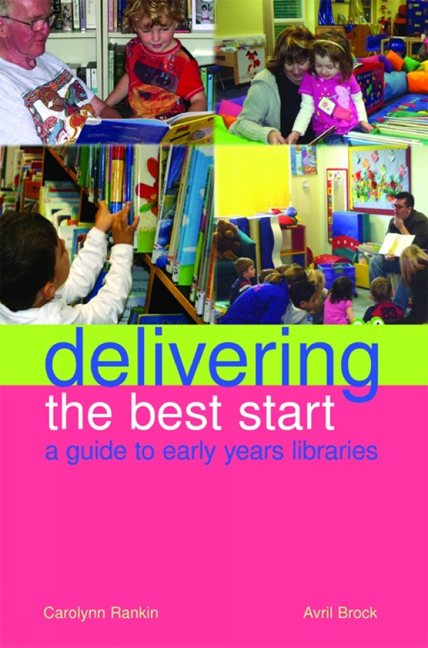Book contents
- Frontmatter
- Contents
- Preface
- Introduction
- Acknowledgements
- 1 Take them to the library – setting the scene
- 2 People and partnerships, skills and knowledge
- 3 Buildings, design and space
- 4 Resources for early years libraries – books, toys and other delights
- 5 Reaching your audience – the librarian's role
- 6 Planning
- Appendix: Early Years Library Services fit with central provision
- References
- Index
Preface
Published online by Cambridge University Press: 08 June 2018
- Frontmatter
- Contents
- Preface
- Introduction
- Acknowledgements
- 1 Take them to the library – setting the scene
- 2 People and partnerships, skills and knowledge
- 3 Buildings, design and space
- 4 Resources for early years libraries – books, toys and other delights
- 5 Reaching your audience – the librarian's role
- 6 Planning
- Appendix: Early Years Library Services fit with central provision
- References
- Index
Summary
‘Ideas for books come at funny moments’ (Robert Westall). Our idea for this one came during a visit to Airedale Library and Family Centre in Castleford. Early years librarians are very good at telling other people's stories – this book is written to tell their story.
Producing this particular story – the book! – has not been a linear process. Our collaboration, between colleagues from two different disciplines has built on one another's diverse experiences to create the end product. Our partnership combines best practice in the two fields of early years education and information and library services. Drawing on each other's experience is one way that new ideas and better and more informed stories are told. The knowledge presented in the book is not all new, but has been refined and developed through listening to each other's decades of experience within our particular fields. What has been most exciting has been the way in which we think along the same lines, although we may take different routes to the goal. We hope the results are both informative and interesting, as we review policy and professional practice in early years services within library settings. We believe that the way this book has been collated and the professional practice it promotes are fairly new to the disciplines, and we hope that the way in which theory and practice has been blended is useful and innovative. This book would not have been written without practitioners, parents and families sharing their knowledge and providing rich examples. We have capitalized on their experiences – taking advantage of shared episodes from professional and family lives.
We want to help early years librarians find a voice in promoting and sharing their own professional experiences and expertise – that is, how they develop and provide services that support young children and their families. This may often be achieved by working in partnership with others. Traditionally, library services for the child did not necessarily include parents and carers but early years library provision extends the traditional boundaries through being inclusive and reaching a range of audiences. Partnership programmes are important and libraries can help to build social capital by providing a safe place for people to meet, socialize and relax.
- Type
- Chapter
- Information
- Delivering the Best StartA Guide to Early Years Libraries, pp. ix - xPublisher: FacetPrint publication year: 2013



